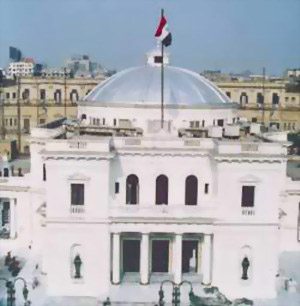 Wit November only a few weeks away, competition among candidates who will then be running for the People’s Assembly (PA)—the lower house of Egypt’s parliament—is rapidly heating up. Once the running candidates are officially approved, they will be scrambling to familiarise voters in their constituencies with their respective electoral platforms, in a bid to win. The contest is expected to be a fierce one, and not without its hazards.
Wit November only a few weeks away, competition among candidates who will then be running for the People’s Assembly (PA)—the lower house of Egypt’s parliament—is rapidly heating up. Once the running candidates are officially approved, they will be scrambling to familiarise voters in their constituencies with their respective electoral platforms, in a bid to win. The contest is expected to be a fierce one, and not without its hazards. The manner in which many candidates conduct their campaigns makes them appear indifferent to any public damage or affront that may cause. Posters carrying their names and images are glued all over the place; never mind if this involves the ugly smearing of walls of private or public buildings, or even utilities. This culture of apathy which governs many a campaign—and the discussion of which has so long been placed on hold—should now prompt a thorough revision of common campaigning practices. True, publicity is needed to acquaint voters with potential representatives, but the question is how best to achieve this goal with no damages incurred. Sticking pictures of nominees on every possible public wall is nothing short of an eyesore, and shows disrespect of the voters’ better judgement. Instead of striving to meet prospective voters, discuss their problems and aspirations, and figure out how best to serve them, candidates behave as though they have landed from another planet and need to stick their pictures everywhere for the voters to get familiar with them. What benefit can there be of the copious display of pictures of candidates who are arguably already known and trusted by the voters? Nominees should presumably have behind them a history of public work sufficient to earn votes without the need to stick their pictures everywhere possible in the face of the public eye. The mere printing of thousands of pictures is a huge waste of money and a practice disdainful of the environment and public benefit. It exposes disregard to public property and throws to the wind concepts of cleanliness and beauty. If the practice goes on unchecked, the streets of Egyptian towns will be turned into venues of messy disfigurement. The situation peaks on election day when leaflets, pamphlets, and all kind of electoral publicity paraphernalia is dumped on the streets. The hard work of cleaning up falls to the lot of the cleaners and garbage collectors. A recent news item in the Cairo press declared that the Wafd, Tagammu, Nasseri and Gabha political parties intended to go to court with a case against the governors who have decided to impose a ‘cleaning-up fee’ upon parliamentary candidates to clean up the litter. The parties saw the fee as an unfair tax against their nominees. Certain practices, however, got beyond the ugly. Two months ago, during the elections for the Shura (Consultative) Council—the upper house of the Egyptian parliament—posters of the candidates were glued on the signposts of the Northern Coast highway, thus concealing all information carried by the road signs. If anything, it exposed an odious fervour and defiance on the part of the nominees who allowed themselves to deprive drivers on the highway of essential information posted to guide and protect them. Last week, as I travelled that road, I saw these posters were still there; they had never been removed. The practice should not be overlooked. If the posters are allowed to remain glued over the road signs until election day, it would be a very serious indication of gross negligence to the utmost degree on the part of the relevant authorities. The traffic authority, local government and, above all, the governors who will be charging nominees ‘cleaning-up fees’ will have ultimately jeopardised the lives of people and failed to shoulder their public responsibility.




